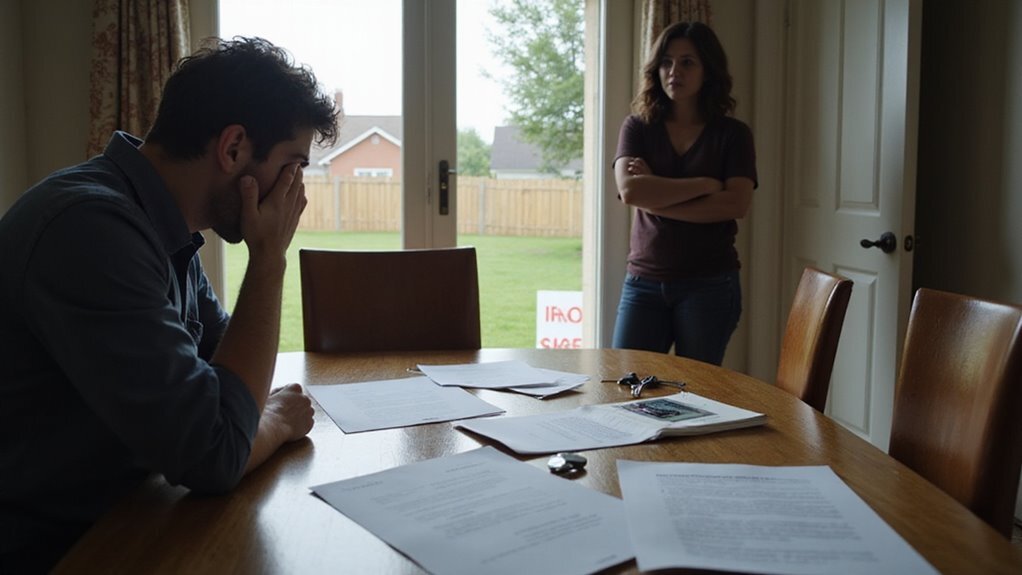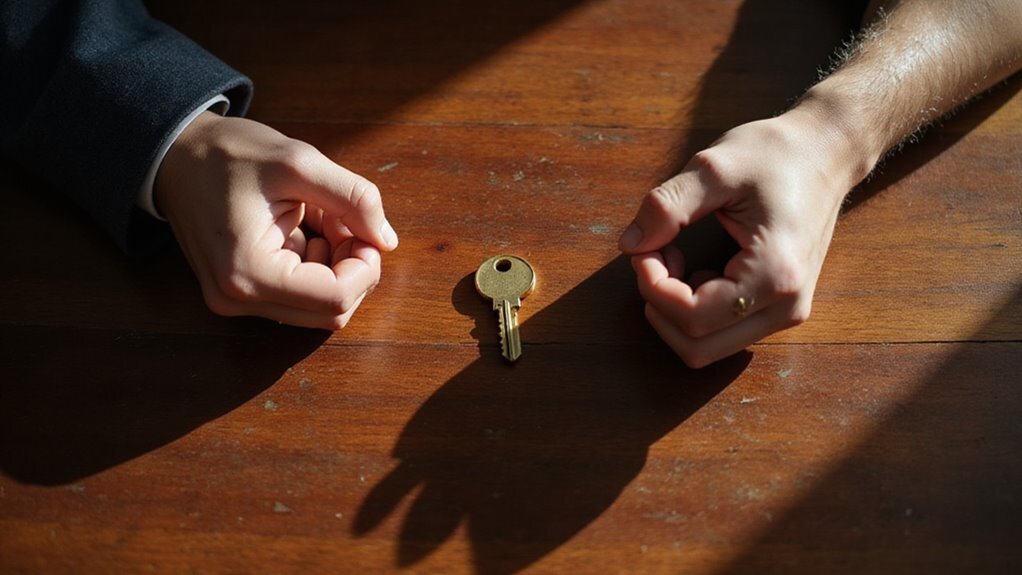Property disputes turn loving homes into battlegrounds when ownership becomes divided and priorities clash. Co-owners find themselves trapped in real estate limbo, unable to move forward with selling decisions. Frustrated sellers often search for loopholes, but legal pathways exist to resolve these challenging property standoffs.
In Florida, you cannot legally sell a house without consent from all co-owners. This applies regardless of your ownership percentage or contribution to the property. Even married couples with only one name on the deed must obtain spousal consent under Florida’s homestead laws.
In this blog I will explore everything related to selling property without complete ownership consent.
Key Takeaways
- In Florida, you cannot sell a jointly owned house without consent from all co-owners regardless of ownership percentage.
- Homestead laws require spousal consent for selling a family home even if only one spouse’s name appears on the deed.
- A partition action under Chapter 64 of Florida Statutes provides a legal avenue when a co-owner refuses to sell.
- Selling property without required consent can lead to sale invalidation and potential financial liability for damages.
- During divorce, Florida courts can order home sales against one spouse’s wishes and divide proceeds equitably.
Can You Legally Sell a House Without Co-Owner’s Consent?

No, you cannot legally sell a house in Florida without all co-owners’ consent. This rule protects everyone’s property rights regardless of ownership percentage.
Florida law provides options when co-owners disagree about selling property. The main solution involves filing a partition action under Chapter 64 of Florida Statutes. This legal process allows courts to force a sale when co-owners cannot reach an agreement. Additionally, Florida’s homestead laws require both spouses to consent when selling a family home. This requirement applies even when only one spouse’s name appears on the deed.
What Are the Different Types of Property Ownership?

In Florida, you’ll encounter five main property ownership structures that directly impact your ability to sell without consent: sole ownership, joint tenancy, tenancy in common, and tenancy by the entirety. Each ownership type carries different rights and restrictions regarding property sales, with joint ownership forms typically requiring all parties’ consent before a transaction can proceed. Understanding your specific ownership structure is essential before attempting to sell property, as proceeding without proper consent can lead to legal challenges and potentially ineffective sales.
Sole Ownership
Sole ownership gives you complete control of your Florida property. You can sell, transfer, or mortgage your home without anyone else’s approval. This structure provides maximum freedom for all real estate decisions.
Florida law fully protects your rights as a sole owner. You can list, accept offers, and close sales based on your judgment alone. Despite this independence, some restrictions apply. If married, Florida homestead protections may require your spouse’s signature when selling your primary residence, even if they’re not on the deed.
Joint Tenancy
Joint tenancy means equal property ownership by two or more people. You cannot sell a jointly owned Florida property without all co-owners agreeing. This restriction protects everyone’s ownership rights.
When co-owners refuse to sell, you have legal options available. Filing for property partition under Florida Statutes Chapter 64 is the most common solution. This court process can force a sale despite disagreement. The legal system provides this remedy specifically for deadlocked ownership situations.
Courts may order a public auction and distribute proceeds based on ownership percentages. This process resolves disputes effectively but has drawbacks. Legal partition typically costs more money and takes more time than reaching a mutual agreement. Nevertheless, it remains a reliable solution when communication breaks down.
Tenancy in Common
Tenancy in common lets property co-owners hold different shares of ownership. Each co-owner can sell their portion independently without permission from others. The buyer receives only that specific percentage of ownership, not the entire property.
When co-owners disagree, solutions exist. Florida Statute Chapter 64 allows filing a partition action to force property sale or division. This legal remedy resolves disputes effectively when communication breaks down. Furthermore, the court will determine fair distribution based on ownership percentages.
Community Property
Florida does not recognize community property laws. Property acquired during marriage isn’t automatically jointly owned between spouses.
Florida homestead laws offer alternative protections for married couples. You need your spouse’s consent to sell your home, even with only your name on the deed. This safeguard prevents one spouse from selling the family residence without agreement.
In divorce situations, Florida courts use equitable distribution instead. Judges divide marital assets fairly based on multiple factors rather than the automatic 50/50 split seen in community property states. The court considers each spouse’s financial situation, marriage duration, and contributions to determine appropriate allocation.
Tenancy by the Entirety
Tenancy by the entirety gives married couples in Florida special property protection. Both spouses own the property completely and equally. Neither spouse can sell without the other’s approval. The property remains safe from creditors who have claims against only one spouse.
This ownership type offers immediate benefits. The surviving spouse automatically receives full ownership when one spouse dies. This transfer happens without going through probate court. Florida law strongly enforces these protections. Unlike some states, Florida never allows one spouse to sell jointly owned property without consent.
Can You Sell if Your Name is on the Deed?
Yes, you can generally sell property when your name appears on the deed in Florida. However, certain restrictions may apply to this right.
Florida homestead laws require your spouse’s consent for selling, even when only your name is on the title. For jointly owned properties, all co-owners must typically agree to the sale. Legal disputes can be resolved through a partition action under Chapter 64 of Florida Statutes if co-owners disagree.
Furthermore, having legal title doesn’t guarantee selling rights in cases involving marital property or inherited real estate. Each situation has unique considerations that might affect your ability to sell independently.
How to Sell a House When a Co-Owner Refuses?

When a co-owner refuses to sell a property you jointly own in Florida, you have several options to break the deadlock. Your most definitive legal remedy is filing a partition action under Chapter 64 of Florida Statutes, which forces a court-ordered sale if negotiations and mediation attempts fail. Before pursuing litigation, you’ll typically save time and money by attempting a buyout of the refusing owner’s interest or working with a professional mediator to reach a compromise.
Legal Partition Action
A partition action forces the sale of jointly owned property when co-owners disagree. Florida law provides this legal remedy under Chapter 64 of Florida Statutes when negotiations fail.
The process starts with filing a lawsuit in the property’s county. Next, the court evaluates ownership interests and property value. Finally, the court orders a sale, usually through public auction, and distributes proceeds fairly among owners.
Before pursuing this option, consider the legal costs involved. Although effective, partition actions require investment of time and money. The court ensures fair resolution regardless of disagreement between parties.
Buyout Negotiations
Buyout offers provide an alternative to legal partition for uncooperative co-owners. This approach typically costs less than court proceedings and reduces conflict between parties.
Begin with a professional property appraisal to determine fair market value. Present your co-owner with a formal written offer. The offer must include purchase price based on ownership percentage, payment terms, and mortgage liability release.
When direct talks fail, mediation offers a middle path. A neutral third party can help both sides find common ground. This process maintains relationships while exploring viable selling options.
Professional mediators excel at finding solutions that satisfy everyone’s financial interests. They create space for productive conversation without the pressure of courtrooms.
Mediation and Compromise
Mediation helps resolve conflicts between property co-owners without going to court. A neutral mediator facilitates discussions to find solutions both parties can accept.
This process costs much less than litigation. Professional mediators create a structured environment where each owner can voice concerns safely. Creative solutions often emerge during these sessions, such as buyout arrangements or delayed sales.
Divorce home sale laws may apply to married couples, adding legal requirements to the process. For instance, some states require spousal consent before selling jointly owned property.
Partial agreements can build momentum even when full resolution seems distant. The preserved relationship between parties often proves valuable long after the property matter concludes.
Court-Ordered Sale
You can legally force the sale of a property when co-owners refuse to cooperate. A partition action lawsuit allows courts to order property sales when negotiations fail. You must file this lawsuit in the county where your property is located under Florida Statutes Chapter 64.
The court will examine each owner’s interest in the property. After review, judges typically order a public sale or auction. All owners receive their fair share of proceeds based on ownership percentage.
For married couples, additional rules apply. Florida homestead laws protect spouses even when their names aren’t on the deed. Courts aim to balance everyone’s rights while allowing necessary property sales. In most cases, judges seek fair solutions that respect all parties involved.
What Are the Legal Consequences of Selling Without Consent?
Selling property without consent from co-owners or spouses can result in severe legal penalties. Florida courts may completely invalidate the unauthorized sale. You could face substantial financial damages through litigation with affected parties.
Ex-spouse rights receive special protection for homestead properties, even without their name on the deed. This protection safeguards their interests against unauthorized sales. Instead of risking illegal actions, a partition action offers a legitimate solution. Through this process, courts can properly divide proceeds when co-owners disagree about selling property.
What If the Property Is Part of a Divorce?

Property in a divorce falls under court jurisdiction regardless of whose name is on the deed. Florida courts can order a home sale even if one spouse disagrees. Neither spouse may sell without court approval or mutual consent during proceedings. The judge might force a sale and divide proceeds equitably between parties.
Legal guidance is essential in these situations. A property dispute attorney can safeguard your interests early in the divorce process. They will help you navigate the legal complexities involved. Furthermore, proper representation ensures your property rights receive fair consideration under state law.
How Can Cash Home Buyers Help With Complicated Ownership Issues?
Cash home buyers solve complicated ownership issues by purchasing properties quickly with flexible terms. They offer immediate solutions when co-owners disagree about selling. These buyers can work with individual owners separately in contested situations.
Cash buyers can purchase specific ownership interests independently, which creates options during disputes. Their fast closing process helps prevent conflict escalation between disagreeing parties. Fair market value offers come without the marketing costs of traditional sales methods.
Although helpful, cash buyers cannot bypass legal consent requirements. You’ll still need proper legal advice for property transactions. Their expertise with difficult ownership scenarios provides value when standard selling approaches don’t work. Most importantly, they reduce friction and simplify the process when ownership complications exist.
Conclusion
Selling a shared property without unanimous consent presents challenges, but solutions exist. If you face resistance from co-owners, legal avenues like partition actions can provide resolution. When traditional methods fail, consulting with a real estate attorney early might prevent costly litigation later.
We at Greg Buys Houses understand these complex ownership situations. We buy houses in Pensacola FL and other nearby cities of Florida State. Our cash purchase option eliminates many complications that arise in contested property sales. We can often work with partial ownership interests when traditional buyers cannot.
In these difficult situations, timing often matters more than maximizing sale price. We offer a straightforward alternative to drawn-out legal battles between co-owners. Our process simplifies what could otherwise become an expensive, time-consuming ordeal. If you’re struggling with co-ownership issues, contact us for a no-obligation consultation.

